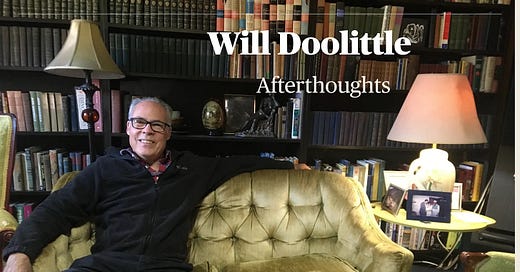I used to say Alzheimer’s was a shadow, trailing me, but it’s catching up now, after six and a half years, and blocking out the light.
I’ve known all along there’s no hope, but I feel it now. I feel the end in the breakdown of basic functions, like eating. I feel it in her lethargy, in the loss of her once-powerful life force.
When she was wolfing down ice cream by the half-gallon, I was amused. Now even the extra creamy vanilla with caramel swirl is unacceptable.
A little bite of melon is a victory these days. A spoonful of oatmeal is worth a celebration.
Alzheimer’s teases. It eases off, and lets us stroll along, getting to know this new place we’re at for weeks or even months.
Then it surges forward, eating away at Bella’s abilities so every day she’s more confused and unable, asking directions to our own bathroom, falling silent in the middle of sentences.
I’m lost, too. I don’t know what the disease will do or how long it will take. I haven’t come up with a single strategy to make things better.
I am here, and I react.
I wonder whether we’ve reached a crisis, because of Bella’s refusal to eat and the weight she has lost. I wrote a desperate column, afraid of what the loss of appetite could mean, but it felt too certain.
Nothing is certain for an Alzheimer’s caregiver, except that the disease will, someday, kill the one you love.
I ended the column by mentioning a photograph I saw somewhere of a man with his arm around his wife’s shoulders — caregiver and loved one sitting together on the couch, the wife asleep and the man content to be comforting her. It seemed a possible future for Bella and me, reaching and accepting a peaceful end.
“But not now,” I wrote. “Not already.”
But Bella and I talked tonight, and I don’t believe we are there yet, in the quiet of acceptance.
“I don’t want to die,” she said.
We hold it each other up. Tomorrow, we’ll make it through another day.
Readings
I finished Jonathan Franzen’s “The Corrections” recently. It’s a novel that makes you happy for the family you have and not the one in this book, as difficult and dysfunctional a bunch as ever fought over Christmas dinner. I think Franzen took too much to heart Tolstoy’s saying about families, which implies that unhappy ones are better subjects for fiction. But does that mean the more unhappy the family, the better the book? At some point, the misery becomes annoying, and Franzen passes that point at 90 mph. Sex or, sometimes, just sexual thoughts, redeems the book, as Franzen, unlike so many writers, makes sex funny and writes about it in creative ways.





I heartily recommend the book, " The Thirty Six Hour Day". My father had Alzheimer's and I found this book a great help. I asked all of his private caregivers to read it, as well. My father was always known for his amazing sense of humor, and for the most part, he never lost this gift. For that we were most fortunate. For me, it made communicating with Dad so much easier and positive. My heart goes out to you and your family.
a thank you for care, honesty, love...for how you simply tell and are with what is real and true...not easy this journey, but you follow your heart to what is and what is not yet known...in your life and in all of our lives, what we are given and how we respond to what we cannot control. Thank you,Will, for this and for your work for so many years with the Post Star.